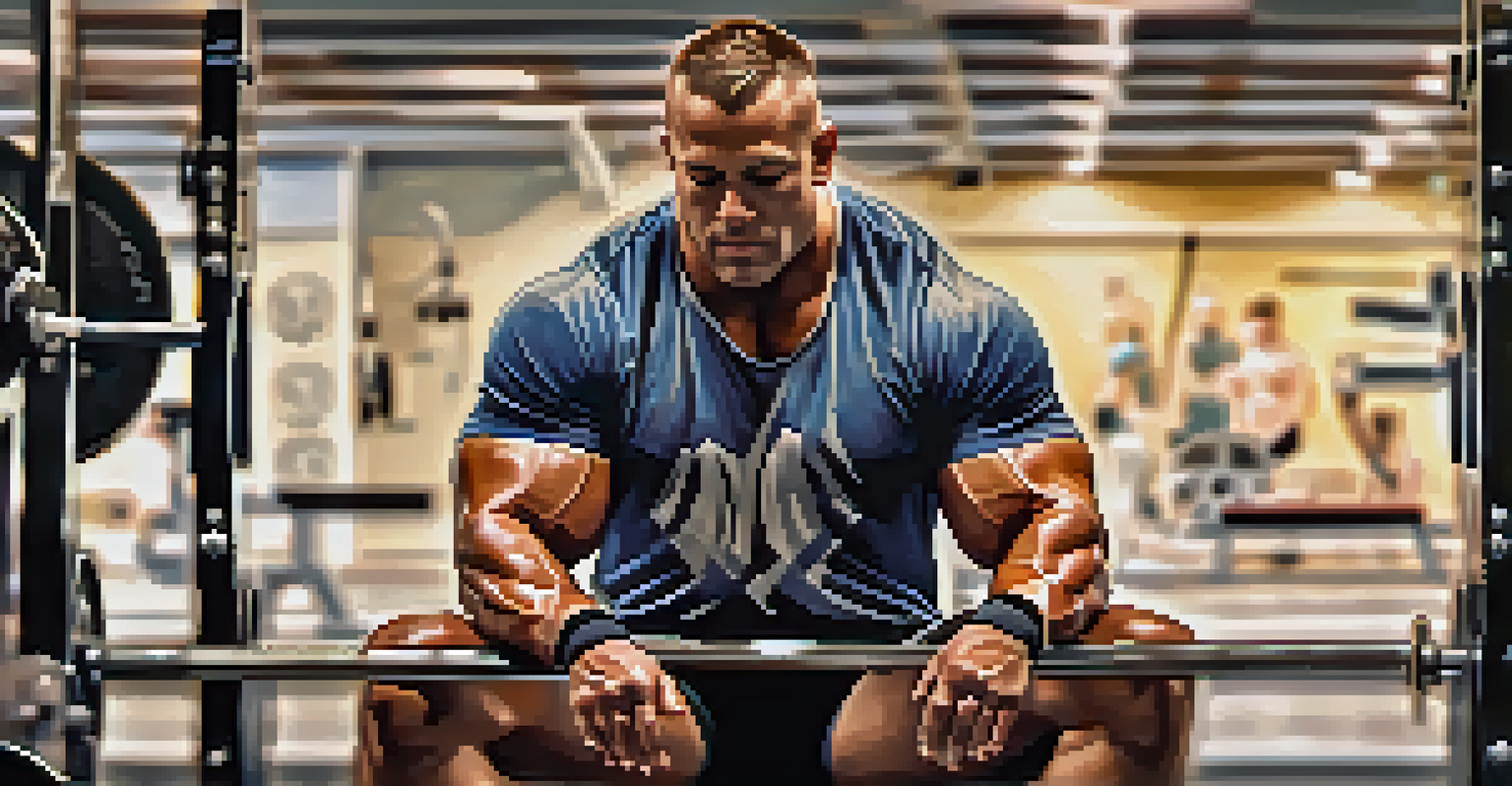The Connection Between Powerlifting and Emotional Stability

Understanding Powerlifting: More Than Just Lifting Weights
Powerlifting is often viewed as a test of physical strength, but it's so much more. It includes three main lifts: the squat, bench press, and deadlift, each requiring immense focus and technique. As lifters progress, they not only build muscle but also learn discipline and perseverance, which are critical elements in any personal development journey.
Strength does not come from physical capacity. It comes from an indomitable will.
For many, powerlifting becomes a mental game as much as a physical one. The commitment to improve in this sport demands a strong mindset, and this dedication can translate to other areas of life. By facing and overcoming challenges in the gym, lifters often find themselves better equipped to handle stress and emotional hurdles outside of it.
Ultimately, powerlifting fosters a unique environment where individuals push their limits, creating a sense of community and support. This supportive atmosphere encourages lifters to share their struggles and victories, enhancing their emotional resilience and stability.
The Psychological Benefits of Powerlifting
Engaging in powerlifting has been shown to have numerous psychological benefits. As individuals lift heavier weights, they often experience a boost in self-esteem and confidence. Achieving personal records can create a sense of accomplishment that spills over into everyday life, improving overall mental health.

Moreover, the physical activity involved in powerlifting releases endorphins, often referred to as 'feel-good' hormones. This natural high can help alleviate symptoms of anxiety and depression, making powerlifting a valuable tool for emotional well-being. It’s like a mental reset button, allowing lifters to tackle life’s challenges with a clearer mind.
Powerlifting Builds Mental Strength
Engaging in powerlifting cultivates discipline and resilience, helping individuals tackle emotional challenges in their lives.
Additionally, the routine of training helps establish a sense of structure in one’s life. Setting goals, adhering to a training schedule, and tracking progress cultivates a sense of purpose, which is essential for maintaining emotional stability. It’s a way to channel energy into something productive and rewarding.
Building a Community: Powerlifting and Social Connection
Powerlifting is not just an individual sport; it thrives on community support. Gyms often create environments where lifters motivate each other, share tips, and celebrate milestones together. This sense of belonging can significantly enhance emotional stability, as social connections are crucial for mental health.
The only limit to our realization of tomorrow will be our doubts of today.
Many lifters find friendships that extend beyond the gym, forming deep bonds over shared experiences and challenges. During tough times, these social networks can provide emotional support, making it easier to navigate personal struggles. Being part of a community fosters accountability, encouraging individuals to stay committed to their emotional and physical goals.
Moreover, the act of cheering each other on during lifts creates a positive feedback loop. This encouragement not only boosts performance but also reinforces feelings of self-worth and validation. In times of stress, knowing that others believe in you can be incredibly uplifting.
Mindfulness and Focus: Powerlifting as a Meditative Practice
Powerlifting requires intense concentration, which can lead to a meditative state for many lifters. As individuals focus on their lifts, they often enter a zone where distractions fade away, allowing them to connect deeply with their bodies and minds. This practice of mindfulness can be beneficial in managing daily stress and anxiety.
By concentrating on breathing, form, and technique, lifters develop a heightened awareness of their physical and emotional states. This self-awareness can be a powerful tool in recognizing and addressing emotional triggers before they escalate. It’s a way of learning to listen to oneself and respond rather than react impulsively.
Community Enhances Emotional Health
The supportive environment of powerlifting fosters social connections that significantly improve mental well-being.
Moreover, the discipline gained from powerlifting can extend to other areas of life, helping individuals develop a more mindful approach to challenges. This newfound focus can aid in problem-solving and decision-making, ultimately contributing to better emotional health and stability.
Setting Goals: The Power of Progress in Powerlifting
One of the core elements of powerlifting is goal setting, which is vital for personal growth. Lifters often establish specific, measurable goals, such as increasing their squat by a certain amount. This process of setting and achieving goals fosters a sense of direction and purpose, which is crucial for emotional stability.
Achieving these goals, no matter how small, can create a powerful sense of accomplishment. Each milestone reached reinforces self-efficacy—the belief in one's ability to succeed—which is essential for maintaining mental health. Celebrating these victories, both big and small, can significantly boost morale and resilience.
Furthermore, the experience of working toward a goal teaches valuable life skills, such as patience and perseverance. These qualities are important not only in the gym but also in navigating life's ups and downs. The mindset developed through powerlifting can help individuals approach challenges with confidence and determination.
Overcoming Adversity: Powerlifting and Resilience
Powerlifting is often a journey filled with ups and downs, mirroring the challenges of life. Whether it’s dealing with injuries, plateaus, or setbacks, the sport teaches resilience. Each challenge faced in the gym can build mental toughness, preparing individuals to handle adversity in their personal lives.
The process of overcoming obstacles in powerlifting is empowering. It reinforces the idea that setbacks are not failures but opportunities for growth. This perspective shift is crucial for emotional stability, as it encourages individuals to embrace challenges rather than shy away from them.
Goal Setting Fuels Personal Growth
Setting and achieving goals in powerlifting instills a sense of purpose and boosts self-efficacy, contributing to emotional stability.
Additionally, sharing stories of overcoming adversity within the powerlifting community can inspire others. It creates a culture of support where individuals uplift one another, reminding them that they are not alone in their struggles. This shared experience fosters a sense of belonging and resilience.
The Lasting Impact of Powerlifting on Emotional Well-Being
In conclusion, the connection between powerlifting and emotional stability is profound and multifaceted. The discipline, community support, and goal-setting nature of the sport contribute significantly to enhancing mental health. Lifters often find that the skills they cultivate in the gym translate to improved emotional resilience in everyday life.
As individuals continue to challenge themselves physically, they also develop a stronger, more stable mindset. Powerlifting becomes a tool not just for building physical strength but also for fostering emotional growth. This holistic approach to well-being is what makes powerlifting a unique and powerful practice.

Ultimately, embracing powerlifting can lead to a more balanced and fulfilling life. With its emphasis on community, discipline, and personal growth, powerlifting offers a pathway to not only lift weights but also elevate one’s emotional state.